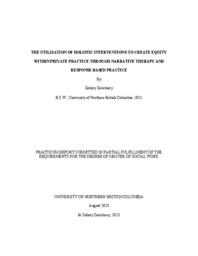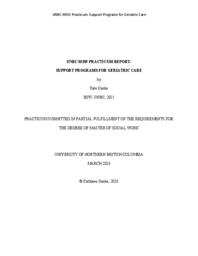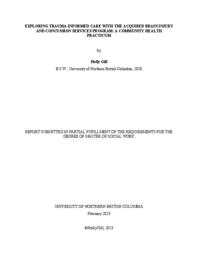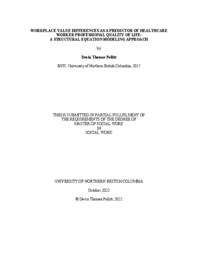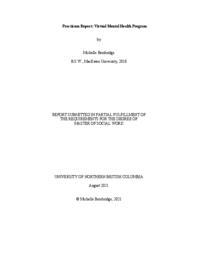Jain, Rahul
Person Preferred Name
Rahul Jain
Related Works
Content type
Digital Document
Description / Synopsis
During my years in the social work field, I have worked with diverse and vulnerable populations, and I have found that clients face barriers that impede their ability to access mental health services. This has become more relevant to society as years pass and more struggles are identified, such as financial, organizational, and systemic impediments. Within my practicum placement at Currents Counselling and Consulting, I encouraged an environment involving equity within social work and private practice. I did this through narrative therapy and responsebased practice with the enmeshment of spirituality and holistic interventions. I was able to adhere to professional practice frameworks consistent with the British Columbia College of Social Workers (BCCSW) Code of Ethics. I aim to call into question how Westernized society has defined what evidence-based practice consists of and what could be used as appropriate interventions. As society evolves, we see significant benefits from approaches and interventions involving more holistic and spiritual perspectives. This report also discusses my practicum experiences, implications, need for ongoing involvement, effective self-care, and concludes with recommendations for social work practice.
Origin Information
Content type
Digital Document
Description / Synopsis
no abstract available
Origin Information
Content type
Digital Document
Description / Synopsis
This report focuses on what I learned about trauma and acquired brain injuries during my Master of Social Work (MSW) practicum at Acquired Brain Injury and Concussion Services with Fraser Health Authority (FHA) located in Langley, British Columbia. This in-depth and unique practicum allowed me to practice independently as a MSW student and utilize my clinical practice skills. In addition to highlighting the role of social workers within interdisciplinary teams and delivering services within the healthcare system. The practicum provided the opportunity to explore the experiences of practicing social work within community health settings and compare my experiences to acute social work.
Origin Information
Content type
Digital Document
Description / Synopsis
People in rural settings deal with many barriers to accessing Mental Health and Substance Use services. Living and accessing services in a small community presents challenges which are impacted by an individual, family or a community’s social determinates of health. Many service providers accommodate large geographic catchment area with limited resources. Furthermore, many rural people face barriers to accessible funds or reliable transportation. These disadvantages to equitable access can prevent community members to see a clinical counsellor or to pick up any of the pharmaceuticals that are essential to their treatment plan. There are also ethical challenges with providing counselling services in a rural setting. Conflicts may arise in respect to one’s own social location and dual relationships within professional roles and responsibilities. During my practicum at Canadian Mental Health Association Cariboo Chilcotin, I worked with an adult population for the first time. This experience provided me with a wealth of knowledge of the diverse needs of people at different stages across their lifespan. My practicum lead me to the realization that best practice includes multi-disciplinary collaboration and continued educational pursuits in order to provide services of the highest quality.
Origin Information
Content type
Digital Document
Description / Synopsis
This MSW thesis explores workplace value differences as a predictor of healthcare worker professional quality of life. Secondary data analysis was performed on data previously collected on hospice and palliative care workers in a 2013 Pan-Canadian Study. The fit of a theoretically informed model to the dataset was analysed, exploring empirical support that healthcare worker value differences within the workplace accounts for a significant part of the variance in their levels professional quality of life. In the Pan-Canadian study, measures of professional quality of life included the Professional Quality of Life Scale (ProQoL). Additionally, the Nursing Unit Cultural Assessment Tool (NUCAT) was also used. This study reviews the pertinent literature, articulates the model suggested above by exploring existing evidence and theory, and tested the model fit using a structural equation model. Understanding the impact that workplace factors have on healthcare worker professional quality of life is an important area of research. Further research utilizing structural equation modeling may help increase our understanding of the multi-factorial nature of professional quality of life measures and its impact on workers, patients, and families.
Origin Information
Content type
Digital Document
Description / Synopsis
People who reside in rural areas are faced with ongoing barriers to accessing mental health services. A number of aspects of rural life such as the rural community, social networks, and limited access to service all have particular implications for people experiencing mental health issues. Additional issues such as the effect of rural culture on help-seeking for mental illness, the lack of anonymity in small communities and the difficulty to maintain confidence, and mental health and addictions stigma may further impact the recognition, treatment, and maintenance of mental health problems for people in rural and remote locations. Providing mental health services to residents in these places requires creative and flexible service delivery options. This practicum report details my experience with the Virtual Mental Health Program at Alberta Health Services and highlights the role that social workers play in delivering mental health services in underserved locations as well as the potentials for further developing these services.
Origin Information
Content type
Digital Document
Origin Information

